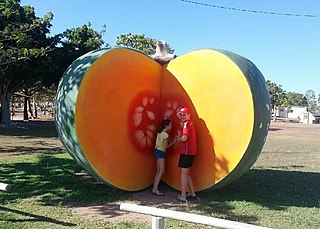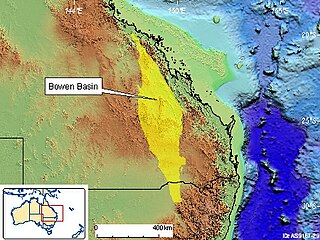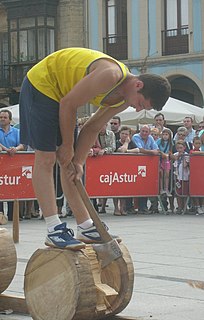
Bowen is a coastal town and locality in the Whitsunday Region on the eastern coast of Queensland, Australia. The town of Merinda and the Abbot Point coal shipping port are also within the locality of Bowen. At the 2016 census, Bowen had a population of 10,377.

Mackay is a city and its centre suburb in the Mackay Region on the eastern coast of Queensland, Australia. It is located about 970 kilometres (603 mi) north of Brisbane, on the Pioneer River. Mackay is nicknamed the sugar capital of Australia because its region produces more than a third of Australia's sugar.

Baralaba is a small town and rural locality in the Shire of Banana in central Queensland, Australia. In the 2016 census, Baralaba had a population of 314 people.

Rosewood is a small town and locality in the Bremer Valley, Queensland, Australia. It is within the local government area of City of Ipswich.

The Shire of Bowen was a local government area in the North Queensland region of Queensland, Australia. The shire, administered from the town of Bowen, covered an area of 21,184.4 square kilometres (8,179.3 sq mi), and existed as a local government entity from 1879 until 2008, when it amalgamated with the Shire of Whitsunday to form the Whitsunday Region.

Gumlu is a town and coastal locality in the Whitsunday Region, Queensland, Australia.
The Collinsville Coal Mine is a coal mine located near Collinsville in Central Queensland, Australia. The open-cut mine lies in the northern Bowen Basin. Collinsville produces coking and steaming coal for both domestic use and export. Exports leave the country via Abbot Point.

Mount Coolon is a small town and locality in the Whitsunday Region, Queensland, Australia. In the 2011 census, Mount Coolon had a population of 567 people.

Springlands is a rural locality in the Whitsunday Region, Queensland, Australia. In the 2016 census, Springlands had a population of 45 people.

Kabra is a town and rural locality in the Rockhampton Region, Queensland, Australia. In the 2011 census, Kabra had a population of 472 people.

The Bowen River is a river located in North Queensland, Australia.

Bowen Consolidated Colliery is a heritage-listed former mine at Station Street and Second Avenue, Scottville, Whitsunday Region, Queensland, Australia. It was established in 1919. It is also known as No. 1 Underground Mine and Bowen Consolidated Coal Company Colliery. It was added to the Queensland Heritage Register on 3 December 2009.

Collinsville Cemetery is a heritage-listed cemetery at Collinsville-Scottville Road, Collinsville, Whitsunday Region, Queensland, Australia. It was built from 1927 onwards. It is also known as Collinsville-Scottville Cemetery. It was added to the Queensland Heritage Register on 18 September 2009.
The Collinsville mine disaster on 13 October 1954 resulted in the death of seven men at the Collinsville coal mine in Collinsville, Queensland, Australia.
Henry Daniel Sinclair (1818–1868) was an explorer and founder of Bowen, Queensland, Australia. Captain Sinclair discovered Port Denison in 1859 in the cutter Santa Barbara.

The Bowen Basin Coalfields contains the largest coal reserves in Australia. This major coal-producing region contains one of the world's largest deposits of bituminous coal. The Basin contains much of the known Permian coal resources in Queensland including virtually all of the known mineable prime coking coal. It was named for the Bowen River, itself named after Queensland's first Governor, Sir George Bowen.

















